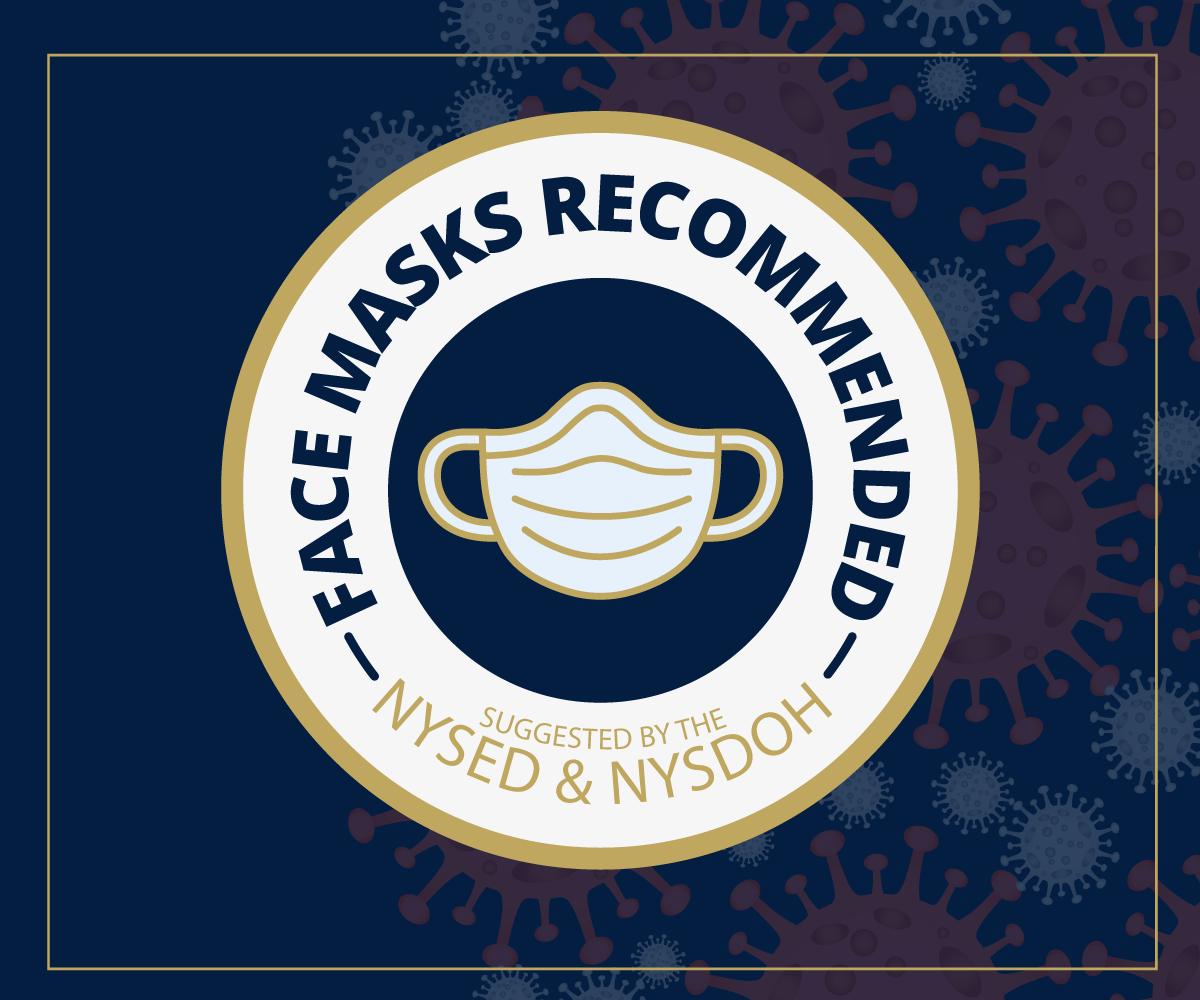NOTICE: This post is over 180 days old. This information may be outdated if you're looking for new or upcoming information.
Winter 2022-2023 Mask Recommendations
Yesterday, Superintendents throughout New York State received a letter from New York's Departments of Health and Education with “Health Precautions for Schools in Winter 2022-23.” It contains guidance that should be carefully considered by every member of our community. Below, please find pertinent parts of that letter:
A host of respiratory viruses, including influenza, RSV and COVID-19, have taken hold in our state and in most of our communities. These viruses, while often manageable, can cause serious outcomes, especially for children. They have been straining our healthcare system and are taxing the availability of pediatric beds across New York.
The number of laboratory-confirmed flu cases has nearly tripled over the past three weeks and flu hospitalizations have more than doubled. In addition, COVID-19 continues to pose a significant threat, particularly for unvaccinated or under-vaccinated New Yorkers, as the virus remains one of the leading causes of death in the United States. In response, The New York State Department of Health (NYSDOH) and New York State Education Department (NYSED) are urging a community-wide approach to again take precautions this holiday season and winter that can prevent the spread of respiratory viruses and protect young children, older individuals, and those with underlying health conditions.
The NYSDOH and NYSED have recommended five "commonsense precautions to prevent the spread of respiratory viruses" for the Winter 2022-2023 season:
- Stay up-to-date on vaccines, including flu and COVID-19
- Wash your hands often with soap and hot water for at least 20 seconds
- Sneeze or cough into your elbow; NOT coughing or sneezing into your hands
- Stay home when sick or symptomatic
- Wear a well-fitting, high-quality mask when in public, indoor spaces
Read their full recommendations here.
_____________________________________
Ayer, los superintendentes de todo el estado de Nueva York recibieron una carta de los Departamentos de Salud y Educación de Nueva York con "Precauciones de salud para las escuelas en el invierno de 2022-23". Contiene una guía que debe ser cuidadosamente considerada por cada miembro de nuestra comunidad. A continuación, encuentre las partes pertinentes de esa carta:
Una gran cantidad de virus respiratorios, incluidos la influenza, el RSV y el COVID-19, se han arraigado en nuestro estado y en la mayoría de nuestras comunidades. Estos virus, aunque a menudo son manejables, pueden causar resultados graves, especialmente para los niños. Han estado poniendo a prueba nuestro sistema de atención médica y están gravando la disponibilidad de camas pediátricas en todo Nueva York.
El número de casos de gripe confirmados por laboratorio casi se ha triplicado en las últimas tres semanas y las hospitalizaciones por gripe se han más que duplicado. Además, el COVID-19 sigue representando una amenaza importante, en particular para los neoyorquinos no vacunados o insuficientemente vacunados, ya que el virus sigue siendo una de las principales causas de muerte en los Estados Unidos. En respuesta, el Departamento de Salud del Estado de Nueva York (NYSDOH, por sus siglas en inglés) y el Departamento de Educación del Estado de Nueva York (NYSED, por sus siglas en inglés) están instando a un enfoque comunitario para volver a tomar precauciones en esta temporada de fiestas e invierno que puedan prevenir la propagación de virus respiratorios y proteger a los niños pequeños. , personas mayores y personas con problemas de salud subyacentes.
El NYSDOH y el NYSED han recomendado cinco "precauciones de sentido común para prevenir la propagación de virus respiratorios" para la temporada de invierno 2022-2023:
1. Manténgase actualizado sobre las vacunas, incluidas la gripe y el COVID-19
2. Lávese las manos con frecuencia con agua caliente y jabón durante al menos 20 segundos.
3. Estornudar o toser en el codo; NO toser o estornudar en las manos
4. Quédese en casa cuando esté enfermo o sintomático
5. Use una máscara de alta calidad que le quede bien cuando esté en espacios públicos e interiores.

ATTENTION: Are your scholars or colleagues doing something great? Please contact the district Communications Team at communications@necsd.net. We’d love to visit your class or event and/or post your pictures and recap to highlight the amazing accomplishments throughout our district!



